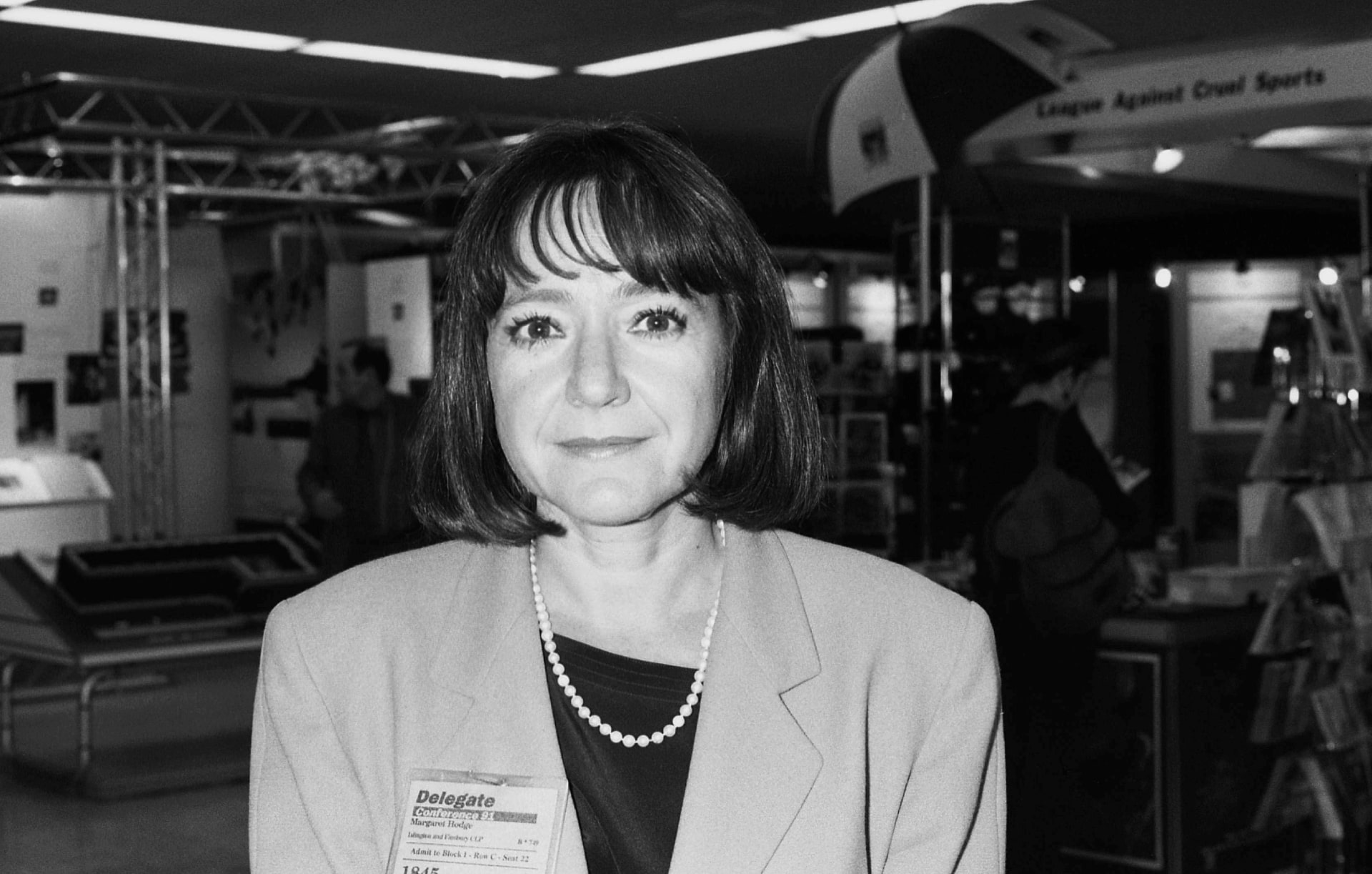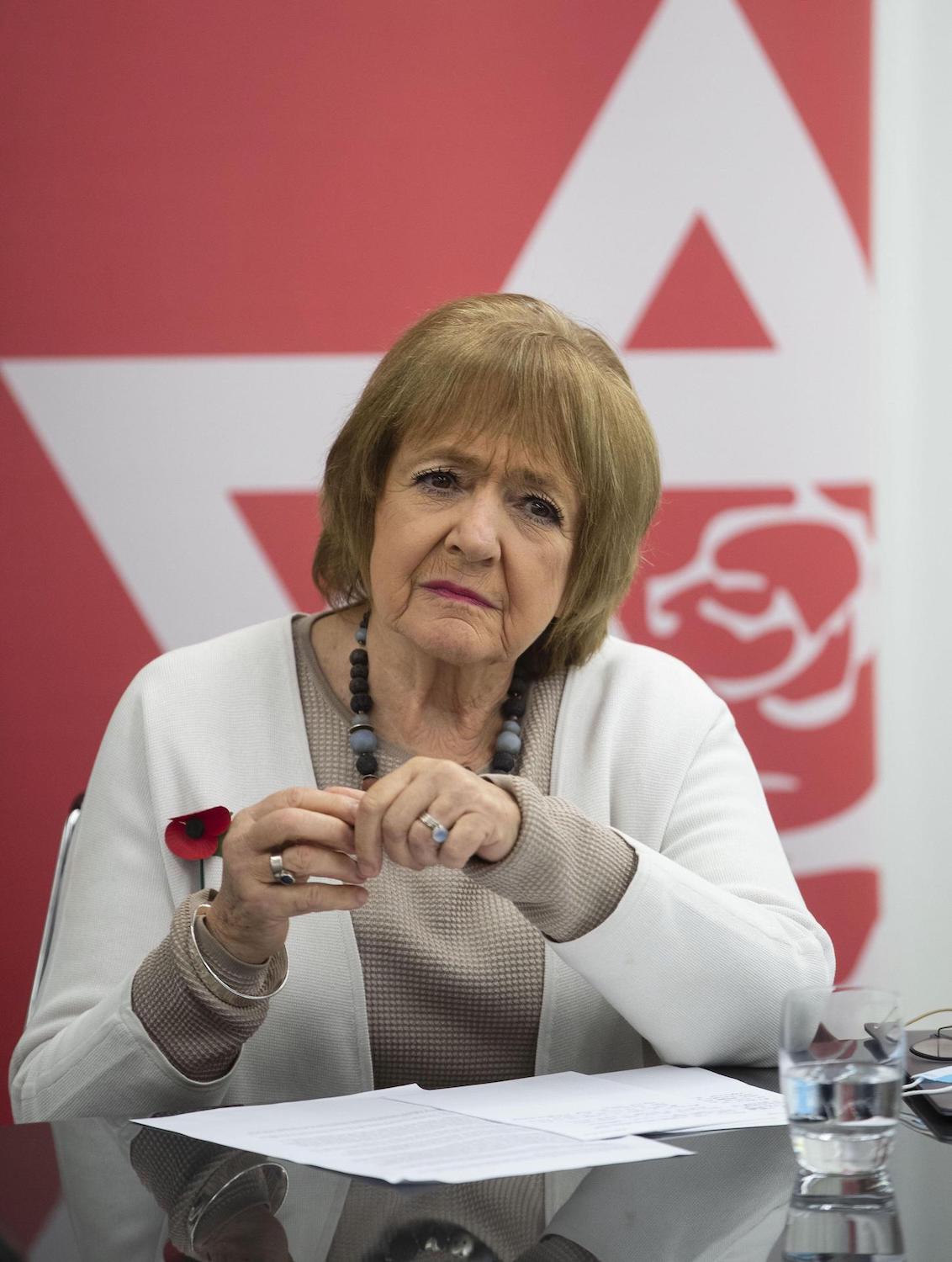Margaret Hodge interview: 'I’m not a paedophile, a tax avoider, a Mossad agent'
Labour MP Margaret Hodge uses her victory speech to attack BNP leader Nick Griffin in 2010 (Credit: PA Images/Alamy)
7 min read
As her time in Parliament draws to a close, Labour MP Margaret Hodge speaks to Sienna Rodgers about her 50 years in politics
The stairs leading up to Margaret Hodge’s parliamentary office in Portcullis House are lined with framed photographs of her many family members, from school portraits to wedding snaps. In the spacious room itself, which boasts an impressive view of Big Ben, the faces of more loved ones peer out from atop various surfaces. It is little surprise the Labour MP has made herself at home in Parliament after more than 28 years there.
Hodge joined Labour at 18 – “much to my father’s absolute fury” – but did not always have political aspirations. “I never thought I wanted a career in politics. My original ambition was to be an actor. I often say that politicians are failed actors and actresses,” she says. “I only became active in politics to keep me sane whilst I was changing nappies.”
“I left everywhere with a little something that changed the world a bit”
She tried teaching and market research before being elected to the local council while pregnant with her second child. Islington is where she cut her political teeth – and it offered both “fantastic highs” and “appalling lows”. Among the latter, Hodge says, is the factional infighting that dominated life in the Labour Party during the 1980s.
By then, she had become council leader, and her main battle was around the rate-capping rebellion that saw local government resist Margaret Thatcher’s efforts to restrict their spending. Eventually, left-wing councils lost the fight and were forced to set legal budgets.
“You’d sit in a Labour Party meeting, and if you dared to put up your hand, you’d have people screaming at you. It was a horrible environment. I remember when we made a rate, there were people up in the gallery, in the council, and they tore the wood off the gallery and threw it at us,” Hodge says.
There was worse to come during her time as council leader, as abuse in Islington children’s homes led to an investigation towards the end of her tenure. She describes this as “the biggest low point” in her political career, and concedes that – by talking only to the professionals involved and not the survivors – “I got it wrong”. “It was a very, very different era,” she says.
There is much the veteran MP is proud of, however. “I left everywhere with a little something that changed the world a bit,” Hodge tells The House. One was her interactions with the local party in Barking, which she describes as having changed for the better, despite having to face a reselection battle in 2019.
“They hated me. They felt it was all my fault the BNP won 12 seats on the council,” she says of members’ reaction to poor 2006 local election results. “I brought a whole load of new people, so now I’m really proud of our local party. It used to be middle-aged, beer-bellied men, probably with a trade union bias. Now it’s young and old, very diverse, men and women – and brilliant.”
Hodge is pleased, too, with her ministerial work on children’s centres and Sure Start, though disappointed some of her achievements were not ultimately future-proof. “Something I was convinced was a new frontier of the welfare state that would be there forever has been systematically dismantled by the Tories,” she says.

Margaret Hodge as leader of Islington Council at Labour Conference in 1991 (Credit: David Fowler/Alamy)
She is most animated when talking about the role she undertook once Labour was returned to opposition in 2010: chair of the Public Accounts Committee. “My husband had just died; Labour had just lost power; I’d just beaten the BNP. I hadn’t a clue what to do with my life. It was a difficult time, and a friend said ‘go onto the PAC’. I thought, ‘God, that’s going to be so boring’.”
To win the post, she recalls: “All I did was go round and say to everybody, ‘I’m a woman’ – they’d never had a woman doing it – ‘and I’ve just been beaten the BNP’.” Her short and simple campaign worked. Once elected, Conservative MP and former PAC chair David Davis told her to look at Vodafone’s tax arrangements.
“I thought, what on earth is this guy talking about? What does a tax deal between a private company and the tax authorities got to do with a committee that is set up to oversee public expenditure for value for money? I learnt very quickly that it went to the heart of the efficiency of HMRC.”
Hodge believes her focus on sweetheart deals as chair of the powerful committee turned tax into a topic of discussion fit for the pub and dinner table as well as Parliament. She did not find the PAC boring at all, and continues to be a prominent critic of tax avoidance.
“Those years at the PAC were among the most rewarding. In those five years, I maybe changed the world a bit more than I was able to as a minister. People get really cross when I say that, but it just shows why Parliament is so important.” Whereas in government she would think every July “sugar, am I going to get sacked?”, the committee’s five-year term gave her security and independence.
Aside from tax, Hodge was best known in recent years for locking horns with Jeremy Corbyn – whose office happens to be just a few doors down from hers, which makes for occasional “interesting” conversations in the lift according to one of her aides. Most memorably during the Corbyn era, Hodge squared up to her leader and told him he was an “anti-Semite and a racist”. This triggered a party disciplinary investigation.
 The way anti-Semitism became central to her political life was a surprise, she says. “I’m a completely atheist Jew, a cultural Jew. My children are the first generation in my family who have never had to flee a country because of anti-Semitism, which is quite something. That is a really important part of me, but it was never part of my politics.”
The way anti-Semitism became central to her political life was a surprise, she says. “I’m a completely atheist Jew, a cultural Jew. My children are the first generation in my family who have never had to flee a country because of anti-Semitism, which is quite something. That is a really important part of me, but it was never part of my politics.”
(Credit: PA Images/Alamy)
When Corbyn reacted to the Equality and Human Rights Commission’s report on anti-Semitism in the Labour Party by stating that it had been “dramatically overstated for political reasons”, he was suspended from the party. Although later readmitted as a member, Keir Starmer decided – after a conversation with Hodge, it is widely understood – that the whip should not be restored.
“[Corbyn] demonstrated that he was still part of the problem. So, reluctantly, we had to condemn him. And it was really reluctant. I didn’t want that EHRC report to be a day when we talked about Corbyn,” Hodge says. “It would have been impossible for us to both be in the same organisation at that point.”
“I’m not a paedophile, a tax avoider, a Mossad agent”
Among Labour MPs, Hodge probably receives some of the most criticism – whether it relates to historic failures over child abuse, accusations of hypocrisy over benefitting from a tax haven herself, or anti-Semitism. How does that make her feel? “I could let it destroy me, or I could put it into this box. And it’s not the real me. I’m not a paedophile, a tax avoider, a Mossad agent, care more about Israel than I do about Barking, all these allegations that have been thrown at me. The abuse is disgusting.”
Hodge has now called time on it: having sat in Parliament since 1994, Hodge will be leaving at the next general election. “I’ve done it for a long time, and there’s a lot of talent coming up. I’ve enjoyed the last three or four years, mentoring people, but I think, give them space. That’s why I’m standing down.”
This is a “hellishly difficult decision”, she says: although she will not miss the “nasty abuse”, nor “fighting the hard left”, she still believes “politics is like a drug”. But as the chair of many different organisations and a grandmother of 12, with a love of piano-playing and travelling, she has plenty to do after Parliament.
Will she be active in local party politics? “Never say never. You know who my MP is? Jeremy Corbyn. I might get involved in the selection… That will be fun,” she laughs.
